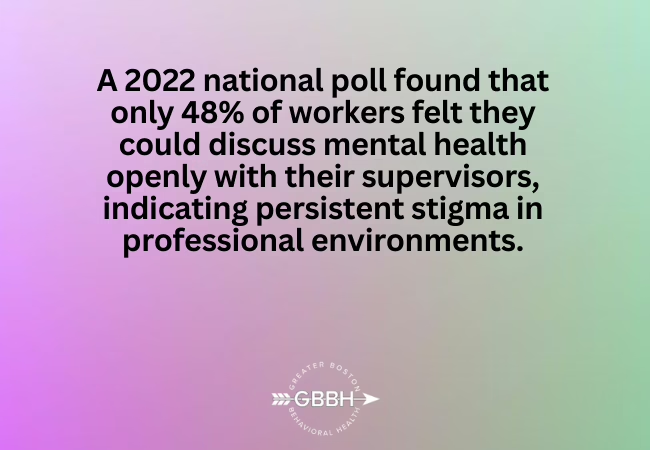Every day, countless people in the center of Boston struggle with mental health issues. However, the widespread stigma associated with behavioral health frequently silences their voices and keeps them from getting the help they sorely require. It’s time to end this taboo and acknowledge that asking for assistance is a brave act of self-care.
Mental health is just as important as physical health, yet stigma continues to prevent many individuals from seeking the care they need. Despite growing awareness and advocacy efforts, misconceptions about mental health treatment still exist, making it difficult for people to take the first step toward recovery.
This guide explores the impact of stigma on mental health treatment, the benefits of professional care, and how to access behavioral health services in Boston without fear or hesitation.
Understanding the Stigma Surrounding Behavioral Health
Despite increasing awareness of mental health, stigma remains a major barrier to seeking treatment. Many individuals avoid therapy, counseling, or psychiatric care due to misconceptions, fear of judgment, or cultural influences.
1. Common Mental Health Misconceptions
- “Therapy is only for people with severe mental illness.”
- “Admitting I need help means I’m weak.”
- “I should be able to handle my problems alone.”
- “Medication for mental health is unnecessary or dangerous.”
These myths discourage individuals from seeking behavioral health services and prevent them from receiving the professional care they need to improve their quality of life.
2. The Impact of Stigma on Seeking Help
Many people delay or avoid treatment altogether because they fear being labeled as “unstable” or “weak.” However, untreated mental health conditions can lead to:
- Increased stress, anxiety, and depression.
- Relationship difficulties and social isolation.
- Decreased work or academic performance.
- Higher risk of substance use or self-destructive behaviors.
Breaking the stigma means recognizing that mental health care is a vital part of overall well-being—just like visiting a doctor for a physical illness.
The Burden of Shame
Social prejudice and discrimination against people with mental health issues are examples of stigma. This unfavorable opinion discourages people from seeking therapy by fostering emotions of shame and loneliness. Many choose to repress their difficulties rather than face them because they are afraid of being stigmatized or misinterpreted. Internal conflicts like these can worsen mental health conditions and make getting better seem like an impossible goal.
The Value of Asking for Assistance
A crucial first step in the healing process is admitting when professional assistance is required. Behavioral health services provide a secure environment for people to examine their feelings, comprehend their difficulties, and create useful coping mechanisms. In addition to addressing immediate issues, therapy or counseling builds long-term resilience by giving people the skills they need to overcome challenges in the future.
Why Behavioral Health Services in Boston Are Essential
Seeking professional mental health treatment can improve emotional stability, enhance coping skills, and lead to long-term healing. At Greater Boston Behavioral Health, we provide customized treatment plans that address various mental health concerns, from anxiety and depression to PTSD and mood disorders.
1. Access to Personalized Mental Health Treatment Programs
No two individuals experience mental health challenges in the same way. That’s why we offer personalized treatment plans that may include:
- Individual therapy for one-on-one emotional support.
- Group therapy for peer connection and shared experiences.
- Medication management for those who may benefit from pharmacological treatment.
- Holistic approaches, such as mindfulness and stress-reduction techniques.
2. Comprehensive Levels of Care
Depending on the severity of your symptoms and your personal needs, there are various levels of mental health care available:
A. Inpatient Treatment Program
- Designed for individuals experiencing severe mental health crises who require 24/7 supervision and care.
- Includes intensive therapy, medical monitoring, and structured daily routines.
- Best suited for individuals struggling with suicidal thoughts, severe depression, or psychiatric disorders.
B. Residential Treatment Program
- Provides a supportive, structured environment where individuals receive intensive therapy and mental health care while living on-site.
- Ideal for those who need long-term treatment without hospitalization.
- Includes CBT Therapy, DBT Therapy, and holistic wellness approaches.
C. Partial Hospitalization Program (PHP)
- A step down from inpatient care, PHP provides structured therapy during the day while allowing individuals to return home at night.
- Ideal for those transitioning from inpatient or residential care but still needing a high level of support.
D. Intensive Outpatient Program (IOP)
- A flexible yet structured program that allows individuals to attend therapy sessions multiple times per week while maintaining their daily responsibilities.
- Helps individuals develop long-term coping skills and emotional regulation strategies.
For individuals in Boston behavioral health treatment programs, having access to multiple levels of care ensures a smooth transition between different stages of recovery.
How to Overcome the Fear of Seeking Help
If you or a loved one is struggling with mental health challenges, taking the first step toward treatment can feel overwhelming. However, breaking the stigma begins with acknowledging that seeking help is a sign of strength, not weakness.
1. Change Your Mindset About Mental Health Care
- Recognize that mental health conditions are medical issues, just like heart disease or diabetes.
- Understand that seeking therapy is proactive, not reactive—you don’t need to wait until you’re in crisis to benefit from counseling.
- View treatment as an investment in your well-being, not as something to be ashamed of.
2. Find a Supportive Treatment Center
Choosing a trusted mental health treatment center in Boston can make a significant difference in your recovery journey. Look for a facility that offers:
- A compassionate and non-judgmental environment.
- Customized treatment plans tailored to individual needs.
- A range of therapy options, including CBT and DBT therapy.
3. Talk to Someone You Trust
If you feel hesitant about reaching out for professional help, consider discussing your concerns with:
- A trusted friend or family member who can support you through the process.
- A mental health advocate or peer support group.
- A primary care doctor or general healthcare provider who can provide referrals.
4. Educate Yourself About Treatment Options
Learning about mental health programs and available treatments can help you feel more comfortable about taking the next step. At Greater Boston Behavioral Health, we provide resources and consultations to help individuals understand their options and determine the best course of action.
Your Rehab Partner: Greater Boston Behavioral Health
We at Greater Boston Behavioral Health are aware of the significant effects of mental health issues and the bravery required to get treatment. Our cutting-edge facility, which is situated in Needham, Massachusetts, only 30 minutes west of downtown Boston, provides a haven for people who are prepared to start their path to wellness.
Adults 18 years of age and older can benefit from our all-inclusive mental health treatment programs, which address a variety of illnesses such as anxiety disorders, depressive disorders, and trauma-based problems. Recovery, in our opinion, is always possible, and sometimes the first step toward moving forward is deciding to leave your current situation.
Tailored Therapy Plans
Since every person’s path is different, we provide programs that are specifically designed to fulfill a range of needs:
- Partial Hospitalization Program (PHP): Usually operating up to five hours a day, five days a week, our PHP offers therapeutic support in a structured setting for individuals who need more extensive therapy than is generally provided by outpatient care.
- Intensive Outpatient Program (IOP): This program provides thorough treatment with flexible scheduling to accommodate daily duties, making it the perfect choice for people looking for organized support without the need for round-the-clock supervision.
- LGBTQ+ Program: As clients strive to manage and conquer their mental health disorders, we take pride in fostering an inclusive environment where people of any gender or orientation can feel comfortable and secure.
Methods of Therapy
Evidence-based therapies are used by our skilled team to guarantee successful treatment outcomes:
- The goal of acceptance and commitment therapy (ACT) is to assist people in discovering their values and teaching them how to live by them.
- Cognitive behavioral therapy, or CBT, is an organized method that assists people in recognizing and altering distressing thought patterns.
Choose a Path to Courage and Live Happily
Greater Boston Behavioral Health is dedicated to supporting you by providing resources, hope, and caring treatment. Keep in mind that your recovery will be more dramatic the more hopeless you feel. We look forward to helping you on your path to better mental health and hope you’ll join us in your recovery.
So, what are you waiting for? Call (617) 307-3842 to speak with a professional about our mental health therapy programs, inpatient treatment, or outpatient services in Boston. This is a brave move toward a better, healthier future rather than a show of weakness. By working together, we can dismiss the stigma and show the way to recovery.
FAQ on Accessing Behavioral Health Services in Boston
Why is there still stigma around mental health treatment?
Stigma exists due to misconceptions, societal beliefs, and lack of education about mental health. Many people believe seeking help is a sign of weakness, but in reality, mental health care is just as important as physical health care.
How does stigma prevent people from seeking mental health treatment?
Fear of judgment can stop individuals from reaching out for help. Stigma often leads to delayed treatment, worsening symptoms, and increased emotional distress. Breaking the stigma helps more people access lifesaving behavioral health services.
What mental health treatment options are available in Boston?
At Greater Boston Behavioral Health, we offer:
- Inpatient Treatment Program for 24/7 care and crisis management.
- Residential Treatment Program for long-term structured healing.
- Partial Hospitalization Program (PHP) for intensive daytime therapy.
- Intensive Outpatient Program (IOP) for flexible, structured care.
- CBT Therapy, DBT Therapy, and holistic approaches for emotional well-being.
How do I know if I need professional mental health treatment?
You should seek help if you experience:
- Persistent anxiety, depression, or mood swings.
- Difficulty functioning in daily life, work, or relationships.
- Unmanaged stress, trauma, or overwhelming emotions.
- The urge to use unhealthy coping mechanisms such as substance use or isolation.


